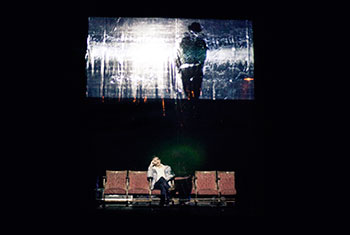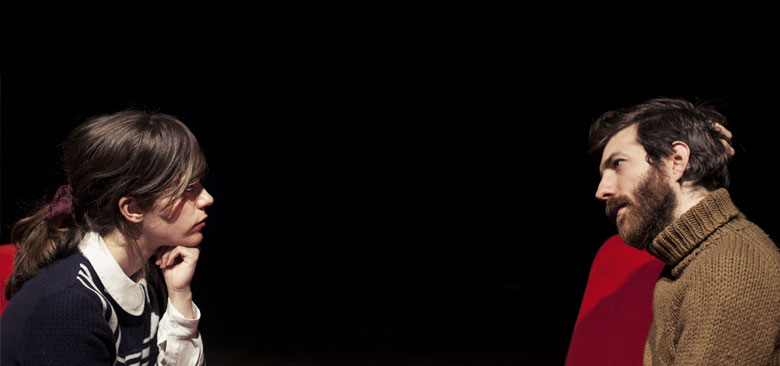After a wait of almost three years, La Tristura makes its triumphant return to the stage with the premier of its latest production ‘Cine’. The air of excitement outside the Sala Verde at Teatros del Canal last night was certainly to be expected given La Tristura’s reputation as one of Spain’s most exciting and innovative theatre companies of the last decade. Their appearance in this year’s ‘Festival de Otoño a Primavera’ is not to be missed!
After a wait of almost three years, La Tristura makes its triumphant return to the stage with the premier of its latest production ‘Cine’. The air of excitement outside the Sala Verde at Teatros del Canal last night was certainly to be expected given La Tristura’s reputation as one of Spain’s most exciting and innovative theatre companies of the last decade. Their appearance in this year’s ‘Festival de Otoño a Primavera’ is not to be missed!
There is something in cinematography, in the distance it creates and the aesthetics of the performance that allows for a language that we can follow and understand. Itsaso Arana.
Despite being formed as recently as 2004, La Tristura boast an impressive international career with notable performances in Paris (Théâtre de La Ville), Munich (Spielart Festival), Krakow (Łaźnia Nowa Theatre) and Brasilia (Cena Contemporânea) as well as domestic appearances in Bilbao and Valencia. Yet, La Tristura’s success in their home city has always been restricted to the ‘alternative theatre’ circuit… until now. This year, the company steps up to the big stage!
With a two-person cast featuring an acting debut from musician Pablo Und Destruktion alongside veteran Argentine actress Fernanda Orazi, the play presents Pablo’s search for his biological identity, a road-trip story with a national twist…
The vision behind ‘Cine’ is born out of a shared love of cinema. The play’s creators Celso Gimenez e Itsaso Arana explain how their frequent visits to the Filmoteca, Madrid inspired ‘Cine’ as a way of reconciling cinematography with the dramatic arts. For La Tristura, this is of fundamental importance. Why? Because according Arana, ‘we live in a post-dramatic age’ where we find it much easier to engage with what we see on the screen than on stage.

© Mario Zamora
For Gimenez, the role of the artist is ‘no longer about just interpreting situations, it is about transforming them’. This is certainly the case in ‘Cine’ as the theatre becomes a cinema, with a giant plastic screen separating the audience from the stage. This radical stage set-up distances us from the action and, with the help of clever lighting, transforms a dramatic performance into ‘living film’. Even more experimental is that the majority of the play is experienced through headphones. This device removes us from the communal sense of audience that we have come to expect and instead immerses us in a profoundly individual experience. By doing this, ‘Cine’ defies the notion of public performance and becomes more intimate and real. By radically altering our conventional ‘situation’ as audience, we are forced to engage differently with what we are seeing.
However, the title is a double entendre which also refers etymologically to movement (kiné). After all, it is movement (both external and internal) that defines Pablo’s journey. Inspired by the real-life story of a friend of La Tristura, Pablo’s search sheds light on the 300,000 cases of stolen infants (‘niños robados’) during the Franco and Post-Franco eras… an atrocity which has only recently come to surface in Spain. In many ways, ‘Cine’ is about raising awareness for these victims.
Yet, the micro-politics of the individual become macro-politics, as the search for identity reflects a larger, national crisis. The play reaches its climax with the revelation that ‘todos somos huérfanos…
the micro-politics of the individual become macro-politics, as the search for identity reflects a larger, national crisis.
la madre que buscas es España’ (‘we are all orphans… and the mother you are searching for is Spain itself’). Thus, ‘Cine’ engages with Spain’s complex relationship with its past and channels these questions through our headphones in such a way that we are invited to question our own identity, both on a personal and national level… are we all as lost as Pablo?
Whilst the plot itself is somewhat underwhelming, La Tristura’s latest piece offers a completely fresh take on theatre that will not disappoint. This ambitious and experimental play oozes class and is sure to delight audiences throughout its festival run. Pablo Unt Destruktion’s music invigorates the drama, with his closing rock concert a passionate and heartfelt cry for Spain to look beyond its complex past: “Tenemos que vivir ahora” (“we must live now”). Exciting and thought-provoking… La Tristura have returned with another gem!
Foto portada © Mario Zamora

